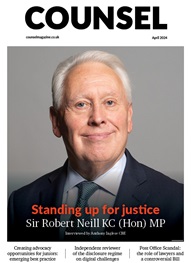*/
Sierra Leone initiative
A special interest group has been established by the Bar Council under the chairmanship of Mrs Justice Dobbs to co-ordinate the pro bono work being carried out in the Sierra Leonean justice system by UK-based organisations.
Set up by Maura McGowan QC after the commitment to assisting the Bar of Sierra Leone made in her inaugural address, the group intends to help provide advocacy and ethics training in Sierra Leone through the Advocacy Training Council. It will also promote other means of strengthening the legal profession, including arranging mentoring for young lawyers, exchange programmes and assisting in the maintenance and modernisation of law library facilities. Anyone interested in joining the group or becoming a mentor, especially those from West Africa, should email: CHudson@BarCouncil.org.uk.
Project Umubano
Project Umubano, the Conservative Party’s international social action project, is looking for barristers to volunteer to join its trip to Sierra Leone in September this year. The project’s work, which was featured in the November 2012 edition of Counsel, includes training for lawyers and paralegals in a range of subjects. For more information see: www.projectumubano.com or email: projectumubano@live.co.uk.
Most judges escape cuts
Three-quarters of sitting judges will escape cuts to their pensions, the government has confirmed. Judicial pensions are being cut back in line with other public service schemes, but those within 10 years of pension age at 1 April 2012 – around 75% of judges – will continue in their current schemes. The remaining quarter of judges will move into the new scheme from 1 April 2015. A “tapering protection” has been offered to those appointed before 1 April 2012, and who were aged between 51½ and 55 at that date. A High Court judge retiring after 20 years of service would receive £86,500 a year plus a lump sum of £173,000 under the current scheme, compared with £75,000 a year with no lump sum under the new plans.
Set up by Maura McGowan QC after the commitment to assisting the Bar of Sierra Leone made in her inaugural address, the group intends to help provide advocacy and ethics training in Sierra Leone through the Advocacy Training Council. It will also promote other means of strengthening the legal profession, including arranging mentoring for young lawyers, exchange programmes and assisting in the maintenance and modernisation of law library facilities. Anyone interested in joining the group or becoming a mentor, especially those from West Africa, should email: CHudson@BarCouncil.org.uk.
Project Umubano
Project Umubano, the Conservative Party’s international social action project, is looking for barristers to volunteer to join its trip to Sierra Leone in September this year. The project’s work, which was featured in the November 2012 edition of Counsel, includes training for lawyers and paralegals in a range of subjects. For more information see: www.projectumubano.com or email: projectumubano@live.co.uk.
Most judges escape cuts
Three-quarters of sitting judges will escape cuts to their pensions, the government has confirmed. Judicial pensions are being cut back in line with other public service schemes, but those within 10 years of pension age at 1 April 2012 – around 75% of judges – will continue in their current schemes. The remaining quarter of judges will move into the new scheme from 1 April 2015. A “tapering protection” has been offered to those appointed before 1 April 2012, and who were aged between 51½ and 55 at that date. A High Court judge retiring after 20 years of service would receive £86,500 a year plus a lump sum of £173,000 under the current scheme, compared with £75,000 a year with no lump sum under the new plans.
Sierra Leone initiative
A special interest group has been established by the Bar Council under the chairmanship of Mrs Justice Dobbs to co-ordinate the pro bono work being carried out in the Sierra Leonean justice system by UK-based organisations.


Sam Townend KC explains the Bar Council’s efforts towards ensuring a bright future for the profession
Giovanni D’Avola explores the issue of over-citation of unreported cases and the ‘added value’ elements of a law report
Louise Crush explores the key points and opportunities for tax efficiency
Westgate Wealth Management Ltd is a Partner Practice of FTSE 100 company St. James’s Place – one of the top UK Wealth Management firms. We offer a holistic service of distinct quality, integrity, and excellence with the aim to build a professional and valuable relationship with our clients, helping to provide them with security now, prosperity in the future and the highest standard of service in all of our dealings.
Is now the time to review your financial position, having reached a career milestone? asks Louise Crush
If you were to host a dinner party with 10 guests, and you asked them to explain what financial planning is and how it differs to financial advice, you’d receive 10 different answers. The variety of answers highlights the ongoing need to clarify and promote the value of financial planning.
Most of us like to think we would risk our career in order to meet our ethical obligations, so why have so many lawyers failed to hold the line? asks Flora Page
If your current practice environment is bringing you down, seek a new one. However daunting the change, it will be worth it, says Anon Barrister
Creating advocacy opportunities for juniors is now the expectation but not always easy to put into effect. Tom Mitcheson KC distils developing best practice from the Patents Court initiative already bearing fruit
Sam Townend KC explains the Bar Council’s efforts towards ensuring a bright future for the profession
National courts are now running the bulk of the world’s war crimes cases and corporate prosecutions are part of this growing trend, reports Chris Stephen